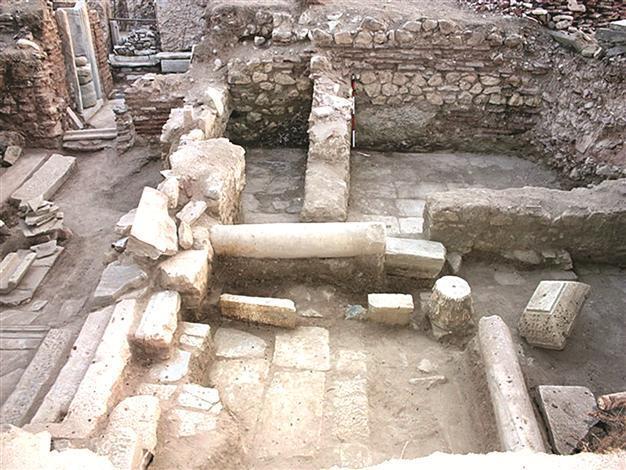Ancient world’s ‘greatest church’ to open as archeopark
ERDEK - Anatolia News Agency

Zeytinliada will be the first archeopark island museum in Turkey, according to mayor Nurettin Öztürk. With the project, Erdek will be open to more tourists.
The Mother Mary church, located in the modern of village of Zeytinliada near Erdek and known in ancient sources as “the greatest church in the world,” has been undergoing excavation since 2006 and will soon open to tourists as a new archeopark.
Zeytinliada will be the first archeopark island museum in Turkey, Erdek Mayor Hüseyin Aysan said. “The area, which covers 200 square meters, will be transformed into a museum. The environs of the museum will also be transformed. We are working on this.” The island was a pilgrimage in times past, said Nurettin Öztürk, an assistant professor at Erzurum’s Atatürk University and the head of the excavation at the site, adding that it could become so again for Orthodox Christians.
“We have come across many tombs in the area. In ancient sources, this church is called the greatest church in the world. The floor and the ceiling are gilded,” he said.
Importance of the siteThe project began with the support of the Culture Ministry, Directorate of Archaeology and Museums and Erdek Municipality in 2006, said Öztürk.
According to the mayor and the municipality in the northwestern province of Balıkesir, the project will open the door to foreign tourists in Erdek.
“During the excavation of the site called the East Church, it took three years to unearth the church itself,” Öztürk was quoted as saying in an earlier Anatolia news agency report. The team has been digging at the site of an adjacent monastery for the past three years.
“The church was located in the monastery complex and also served as a baptistery church. Both belong to the early Byzantine era. The story of the construction of the church is very similar to that of the Hagia Sophia, dating back to 532-537 A.D.,” Öztürk said.
“At that time, the local citizens rose up in protest against the high taxes imposed by the empire. The revolt had to be quashed, and at the direction of the emperor, the citizens were gathered in the hippodrome and 30,000 people were slaughtered and burned. The rebellion was suppressed, and it is known as the ‘Nika Rebellion.’ The empire wanted to create the world’s largest dome in memory of its victory over the rebellion, and that is how the Hagia Sophia came to be built,” he said.
“Our work has progressed,” he said. “Restrooms, walkways and observation zones are under construction. A restoration project will be brought into action. This is an important place for religious tourism.”
He also said it would be the first archeopark island museum. “We hope to achieve success with the help of sponsors. This will be a significant step for tourism.”
The Mother Mary church has a 1,500-year history, Öztürk said. “We have also found Roman coins dating back to the second and third centuries A.D. There are numerous coins at the site that came from various parts of the world.”
The plan of the church’s construction is typical of Orthodox church architecture. “The pool of the baptistery is different from others: It is two meters long, made of marble and carved with a unique design. These features make it unique. In those times, [people] were also baptized,” Öztürk said.
Visitors began to come to the site even before it was advertised, Öztürk said.
